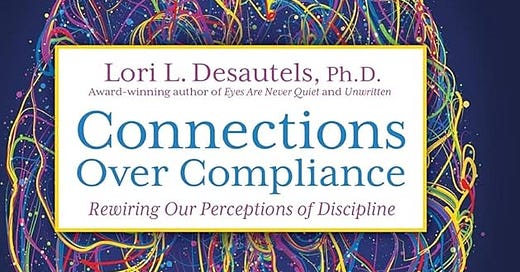Book Review: Connections Over Compliance
Rewiring Our Perceptions of Discipline, by Lori Desautels, Ph.D. (2020)
Key words
Education, co-regulation, trauma-informed, relational discipline, student-centered, classroom management, neuroscience, teaching
My intention was to skim Connections Over Compliance again to extract a few highlights for this review. Instead, I found myself rereading from Page 1 thinking – as was the case on first read – this needs to be published on 90-foot billboards across the educational landscape.
‘Rewiring Our Perceptions of Discipline’
Dr. Lori Desautels’ argument is provocative in its simplicity: rigid expectations, pressure and punishment are the wrong tools to address challenging student behavior.
“Behaviors tell our stories, signaling the pain we can barely speak of or understand,” Desautels writes. “Behaviors are always communicating our needs, feelings, and… fears that feel to big to contain.”
Fear, stress and trauma-based behaviors cannot be fixed by
adding more fear or stress in the form of punishment.
Rather, educators and other involved adults need to re-imagine classroom management.
The big idea
“Behavior management is not about students,” Desautels argues. “Behavior management is about adults.”
Two sentences: one simple philosophy: if we as educators want engaged, caring, positive, emotionally attuned, empathetic students we’d better start by being engaged, caring, positive, etc.
Desautels calls this ‘relational discipline’, which she describes thusly:
“Educator brain state and co-regulation are at the heart of relational discipline. We begin to build sustainable relationships, mutual respect, and trust through emotional attunement…. The truth is that we work harder for people we like, and when students feel respected and trust us, we are helping to shape brain architecture that produces their reasoning, regulation, problem-solving, and attentional skills. When children remain in alarm states, cognitive learning is impaired.”
As a nascent educator, I briefly tutored for an after-school program at a Memphis charter school, i.e., a public school that had crumbled to the point it was privatized. Five or six 10-to-12-year-old girls were assigned to my group.
Expect trouble, was the warming (not in so many words). They’ve witnessed violence. They have family members in prison. They come to school hungry.
Should it have been a surprise my charges had zero tolerance for, or interest in, my sorry attempts to be an authority figure?
The first few days they literally ran screaming through the halls. Helpless, mortified, feeling a fool, I tried to be more authoritative.
One afternoon, to my relief, only three girls showed up: few enough to huddle around a single table and read a story. The transformation was boggling. They wanted to read, wanted to tell me their ideas about the story; they even started planning our next session.
They just want positive adult attention.
That revelation has stuck with me.
Desautels focuses on students who experience severe trauma, such as homelessness, racism or loss of a parent, but relational discipline is equally relevant for kids who don’t come to class draped in red flags.
Growing up is tough. Even young people from comfortable, loving homes have to deal with peer pressure, friendship, family relationships, sexual maturation, etc. – none of which come easy. They need attuned, empathetic teachers, too.
Another, more recent, experience drove this point home. Again, I was teaching was a small group of 11 and 12-year-olds (truly, the years for which the universe should have made a fast-forward button). This time, though, from wealthy families. One took a cheese grater to my nerves from day one. Whiny. Obnoxious. Disruptive.
In the first weeks, positive reinforcement was gritted through teeth. Then the student started to come early to class, read ahead, urge their classmates to stay on task. Praise was no longer a chore.
Our attitudes adjusted: we looked forward to seeing each other and trusted each other to uphold shared standards of behavior.
Connections Over Compliance explains the what, how and why of such evoluttions. The what includes research on trauma, healing and neuroplasticity. The how, guidance on implementing relational discipline. Why? Because everyone in a classroom deserves to be safe, happy and effective.

My take
French philosopher Simone Weil defined force as “that x that turns anybody who is subjected to it into a thing.” Force-based discipline turns students and teachers into tokens in a game nobody wins. Desautels’ arguments are persuasive, urgent and evidence-based; it’s time to stop thinking in terms of rules and obedience and embrace co-creation and co-regulation in the classroom.
Their take
“One of the major features of this book that sets it in a class by itself, is the information, practical strategies, and extensive resources about preventative measures. Typically, preventative measures have focused on teaching expected behaviors and on de-escalation. These approaches are not effective for preventing autonomic, non-volitional stress responses. Teaching students about their brain, including the parts of the brain, how the brain regulates their level of feeling calm or fearful, how their actions are impacted by their brain state, and things they can do to move their brain state from fear to calm are all effective preventative strategies.”
– Beth Tolley, Alliance Against Seclusion and Restraint, Sept 28, 2020
Must read for
Teachers, administrators, parents
Read also
Uncommon Sense Teaching by Barbara Oakley, Beth Rogowsky, and Terry Sejnowski
The Body Keeps the Score by Bessel Van Der Kolk
How to do the Work by Nicole LePera





